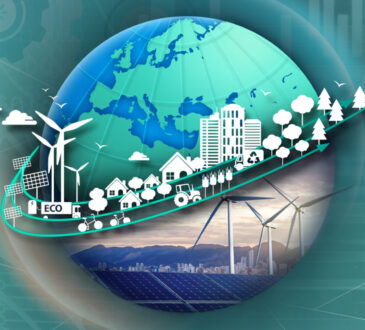Misconceptions that the paper industry is the enemy of forests
Simon Pilkington is Director of Fedrigoni UK argues that the paper industry gets treated unfairly when its sustainability credentials are discussed
This year’s COP27 occurs against a backdrop of war, extreme weather conditions, rising energy prices and great political and economic instability. The human cost has never been more palpable. Sentiments have been divisive, ambivalent even. As I write this, environmental activists, Just Stop Oil, are wreaking havoc on UK’s major motorways.
Governmental responses worldwide are still being outpaced by the unfolding climate crisis. But industries, and indeed consumers, do have the potential power to catalyse change where governments have dragged their heels. Contrary to those who deride climate change as a leftist issue fronted by activists who oppose prosperity and progression, industries that are failing to clean up their operations to become more environmentally sound will increasingly lose relevancy, market share and profitability in the future.
A study by the Capgemini Research Institute substantiates this projection. It showed a huge majority of consumers (79 per cent) are changing their purchase preferences based on sustainability and that this behavioural shift directly affected business success (77 per cent of companies said that their sustainability approaches increased customer loyalty with 63 per cent seeing a revenue uptick). If one isn’t bought in by the moral or ethical rationale for sustainability then the hard, unemotive commercial case for it is indisputably compelling.
A key frustration is that commitments to net zero by major economies are routinely made but are insufficiently acted upon. A report released on the back of COP26 last year, for example, purported that no one sector is doing enough to limit climate change to 1.5oC – the level at which scientists say must be achieved in order for the devastating impact of climate change to be mitigated.
Speaking of sectors, the paper industry is often misconceived. Often, when one thinks of paper companies and mills, one would not ordinarily align it with sustainability. On the contrary, it can be seen as the enemy of forests. Is it an unwarranted image? There are differing opinions. As an industry, however, it has made great headway in giving back what it has taken out to become one of the most sustainable sectors in Europe: from putting back into the environment water that is cleaner than when it was first drawn out to its use of waste heat to increase energy efficiencies in its production processes.
Plants and trees are the planet’s best carbon-capture devices. Over a single year, a mature tree will take around 22kg of carbon dioxide from the atmosphere (EEA, 2016), and over the past four decades, the world’s forests have moderated global warming by absorbing around a quarter of the carbon dioxide emitted by human activities (Government of Canada, 2021). Good forest management is crucial to effective decarbonisation using trees. The paper industry is constantly planting, harvesting, and replanting to maintain healthy forests. Since forests sequester most carbon when the trees are in their growing phase, this process takes even more carbon out of the atmosphere.
These forests, which act as a major carbon sink, are growing: between 2005 and 2020, European forests grew by 58,390km2 – an area larger than Switzerland and equivalent to 1,500 football pitches of forest growth every day (Forest Europe, 2020).
Given the industry’s use of renewable energy (the European paper industry produces 54.3 per cent of its electricity on-site, of which more than 96 per cent is generated through highly efficient CHP plants), its impressive recycling record and ultra-low emissions (it has reduced its carbon emissions by 26 per cent since 2005 and increased the share of renewable energy consumption to 62%), paper contributes generously towards better carbon capture. It’s a little-known fact.
Some might wonder what the relevancy of paper is anyway in an ever-digitised world, yet it is a material that forms part of the fabric of our daily lives, used unthinkingly and taken for granted. From the books we read to the protective packaging of the products we buy, the greeting cards we send to the labels on those fine vintages of wine we drink – the faithful paper is there from both a practical and creative perspective and will continue, as a medium, to endure and thrive irrespective of what the sceptics might think. Moreover, innovations in paper are allowing it to become a more versatile and durable alternative to plastic. Naturally, there is a great onus on the paper industry to ensure end-to-end manufacturing processes are truly sustainable and that end products are, in themselves, recyclable too.
Again, this matters because it concerns consumers greatly. A survey conducted by Two Sides, a not-for-profit campaign funded by the sector to promote the sustainable nature of print, paper and paper packaging found that nearly half of consumers (48 per cent) are avoiding retailers that are not actively trying to reduce their use of non-recyclable packaging. A further study by Pro Carton found that 75 per cent of European consumers say the environmental impact of a product’s packaging affects their decision-making process, with 77 per cent saying they would pay more for a product if it came in more sustainable packaging.
The European paper industry is building on decades of work done to make its industrial model sustainable and circular. Critically, it is working against deforestation and actively contributing towards the growth and maintenance of sustainable forests as part of a wider vision to transition to a more fossil-free economy. There is of course always room for improvement and industries, paper included, cannot afford to rest on their laurels when the destructive manifestations of climate change are becoming alarmingly apparent. Disruptive technologies across industries must catalyse change to mitigate environmental damage. Where moralising, pontificating and protesting are failing, industries that remain reticent in cleaning up their practices must listen to the wants of their consumers. For how industries behave from hereon will critically determine what kind of world we live in tomorrow or if the immediate generations that succeed us will have a future at all.





